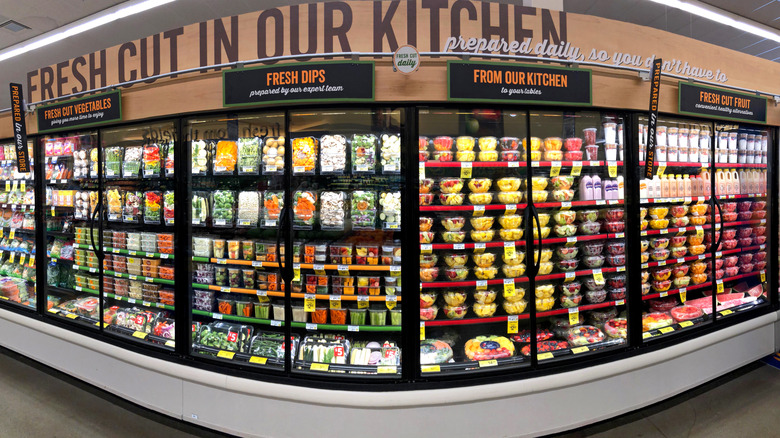The Red Flag To Watch Out For In Your Local Grocery Store's Refrigerator Aisle
When purchasing perishable goods, the last thing one should have to worry about is whether these refrigerated items are safe to eat. You would generally trust your local grocery store to refrigerate fresh and frozen foods properly, ensuring that what customers purchase is kept fresh. However, from time to time, issues with a store's refrigeration system can affect the items it should be keeping cool, thus increasing the chance of potential food safety risks. This may result in one of the most glaring red flags you ought to look out for while cruising the refrigerator aisle: sweaty food.
Simply put, sweaty food is any food product that has moisture inside the packaging or even around the packaged item itself. Moisture is an indication that the temperature inside the fridge isn't cool enough, likely because a door has been left open or ajar for a considerable amount of time. When fresh or frozen foods aren't kept at sufficiently cool temperatures, they are at high risk for dangerous bacterial growth — and food that houses bacteria puts you and your family at risk. It is important to always remain vigilant when shopping, because, ultimately, you choose what products you buy. Keeping your eyes peeled for telltale signs that food isn't as fresh as it should be is vital.
Other signs that fresh foods may be spoiled
What is the perfect temperature for a refrigerator? It must be below 40 degrees Fahrenheit, but ideally, should fall between 35 and 38 degrees. Likewise, a freezer should never be higher than 0 degrees Fahrenheit. Fluctuations in these temperatures could occur if there is a fault in the refrigeration system, a broken door seal, or if the door is left ajar — something that could easily happen if another shopper doesn't close it properly after removing an item.
So, if you notice any sweating on fresh items at the grocery store or if frozen food items are wet or have ice crystals on them, do not add them to your basket. Instead, be sure to alert a staff member so that they can remove the affected items and check the refrigeration system. You won't just be saving yourself from possible illness; you will be protecting other customers as well.
Another indication that there could be trouble with refrigerated foods is if the shelves are overpacked. Since cold air needs to flow in order to keep foods cool, a lack of space could put these items at risk. Additionally, be sure to always check the expiration dates on any item before popping them into your basket. The further perishables are from their expiry dates, the more at risk they are for bacterial growth.

